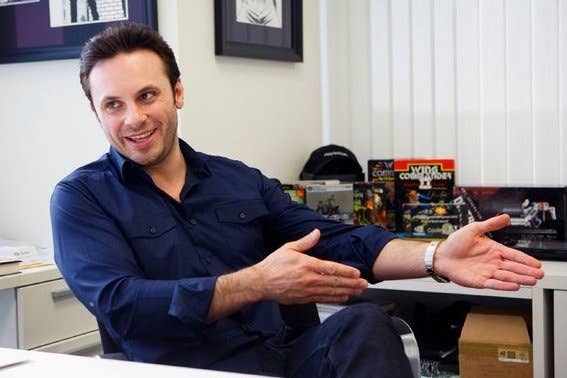VR will be in "almost every household" - Oculus
CEO Iribe sees VR following similar trajectory to smartphone adoption, says tech needs more than just ports to play before consumer debut
There's no stopping VR now. That's according to Oculus CEO Brendan Iribe, who spoke with GamesIndustry International at last week's E3. The technical and cultural hurdles are coming down, and the main challenge left standing between the Oculus Rift headset and a successful launch is a simple paucity of great experiences to play on the hardware.
"We're still building out the platform, we're still building out the core technology, that core hardware, and we also are building out the ecosystem and the content. So we're putting together this amazing dream team of engineers to focus on our side but the community also needs time to build out and teams need to come together to build great content and great experiences. And we need to get them the developer kits and equip them with the hardware that allows them to then go and build these great experiences. And once there's enough really polished, made-for-VR--not ports, but made-for-VR--experiences, then we'll be ready to go to the consumer market."
Iribe said that's going to happen soon, with Oculus ramping up investment in its own original titles. The company was using E3 to show off its original mascot platformer Lucky's Tale, the space dogfighting game EVE: Valkyrie, and Oculus-compatible versions of the bullet-dodging first-person shooter Superhot and Sega's survival horror Alien: Isolation, based on the classic sci-fi franchise.
"Once there's enough really polished, made-for-VR--not ports, but made-for-VR--experiences, then we'll be ready to go to the consumer market."
Once the early adopters have a few games and retail hardware in their hands, Iribe sees VR taking off in the mainstream in short order. While he acknowledged that VR presents a marketing challenge (its value can't really be communicated by simply watching other people enjoy it), he expects that much like the original PCs, word-of-mouth and trying out a friend's unit will help drive quick adoption. People will see VR as a technology worth investing in once they experience what he calls a "true sense of presence" in a virtual world.
"We haven't gotten it with our Oculus developer kits," Iribe said. "You can't get it with what Morpheus is showing now which is also a developer kit. But you will get it with the consumer quality product. When people get that, I think it's going to attract a huge amount of developers to make content very quickly. And then it'll be ready."
Iribe said Oculus is already working with hardware superior to its latest dev kit in a number of ways, most notably addressing what was previously thought to be a potentially unsolvable problem in motion sickness.
"In the last year we've made this incredible leap of progress on the core technology and understanding what causes disorientation, what we call simulator sickness, in VR," Iribe said. "I'm really super happy to say that I no longer think it's a big elephant in the room and a big issue. There's going to be other big issues that we'll face but it's no longer going to be simulator sickness."
Iribe said he is perhaps the most simulator sickness susceptible person at Oculus (with the possible exception of Michael Abrash), but has had no problems with an internal prototype the company has based on the work of former Valve employees like Abrash. Using "The Valve Room" setup, Iribe said he's never experienced motion sickness, and said only a handful of some 400 people he's demoed the technology to have had any such issues.
"You cannot hold back VR. You can't hold back cellphones. You can't hold back the PC. It's going to happen. It's either Oculus or it is somebody else."
"So I would never have expected that. I was hoping we would get to 70 percent, 80 percent, but to get to something like 97, 98, 99 percent of people being comfortable, including myself - for 45 minutes I spent in there - gives a lot of hope that it is actually a largely addressable issue."
Even if the simulator sickness issue is addressed, a different kind of optics could still be an issue for Oculus. Take-Two's Strauss Zelnick called the technology "anti-social" while Nintendo of America's Scott Moffitt called it "solitary," both while praising VR as an interesting technology. Although video game violence appears to be perennially a single tragedy away from the headlines, Iribe brushed aside concerns about how parents would view the idea of video games they can't monitor over their child's shoulder.
"I'm not worried about it, " Iribe said. "We'll put all kinds of parental management and security and privacy features in the system. We're very aware of that and we're going to try to build a platform that really caters to parents...This is a technology, it's one of those things where some people [say,] 'But yeah, aren't you worried that X, Y and Z could hold this back?' You cannot hold back VR. You can't hold back cellphones. You can't hold back the PC. It's going to happen. It's either Oculus or it is somebody else.
"There's no holding this back. This is going to take off like wildfire and it is going to be, within some number of years, almost every household out there will be enjoying VR. Everybody will have experienced VR just like they have experienced the computer or the mobile smartphones. It's going to be that powerful that fast and there'll be sensational topics that show up just like there are around computers or around console gaming or around the mobile phone. I mean, hey, we all walk around in a mobile phone zombie world, and we all look like we're staring at these phones all the time. Is Apple or Google concerned about us staring at our phones the whole time?"

